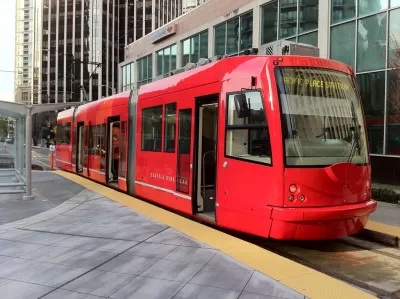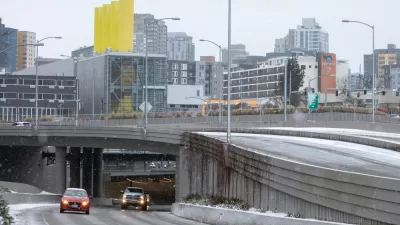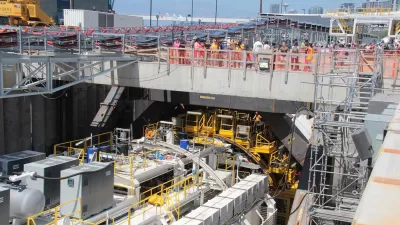By some measures, Seattle's geography makes other cramped cities like Boston and San Francisco seem positively agoraphobic. New Transportation Director Scott Kubly has vowed to keep Seattleites moving through its many bottlenecks.

Few cities present such transportation challenges as Seattle does. With the center city booming over the past decade, thanks in part to the tech industry, demands on downtown infrastructure grow by the day. Unfortunately, according to some, the city's infrastructure is a good decade or two out of date (with less rail than in similar cities), creating insane bottlenecks that are exacerbated by the city's unique layout.
"Part of the problem is simple geography. Seattle is sandwiched between Puget Sound and Lake Washington, and pinched by other lakes and water bodies as well. North-south travel bottlenecks at a handful of bridges, as does any travel to suburbs to the east. (To go west, you’ll have to take a ferry, which creates its own set of challenges.)"
Seattle would seem to be the perfect place for light rail and active transportation, especially because of the city's enthusiastic environmental community, but funding challenges and other opposition have hindered efforts to develop multi-modal transportation. In fact, automobile advocates rose up recently to claim that the city's nascent efforts to promote modes like bike sharing represent a "war on cars." Never mind that fewer cars on the road make things better for those who do drive.
Entering into the fray is the city's new transportation director, Scott Kubly.
"Under Kubly, the Seattle Department of Transportation (SDOT) has laid out an ambitious plan to overhaul the city’s streets. The plan, called Move Seattle, is remarkable in many ways, but none more than this: While it includes maintenance and repair of existing roads, and upgrading bridges to make them earthquake-safe, there are virtually no new accommodations for cars. Instead, it is a plan to more efficiently move people around the city by bus, transit, bike, and on foot."
FULL STORY: Seattle’s smart plan to remake its streets

Planetizen Federal Action Tracker
A weekly monitor of how Trump’s orders and actions are impacting planners and planning in America.

Restaurant Patios Were a Pandemic Win — Why Were They so Hard to Keep?
Social distancing requirements and changes in travel patterns prompted cities to pilot new uses for street and sidewalk space. Then it got complicated.

Map: Where Senate Republicans Want to Sell Your Public Lands
For public land advocates, the Senate Republicans’ proposal to sell millions of acres of public land in the West is “the biggest fight of their careers.”

Orange County, Florida Adopts Largest US “Sprawl Repair” Code
The ‘Orange Code’ seeks to rectify decades of sprawl-inducing, car-oriented development.

Maui's Vacation Rental Debate Turns Ugly
Verbal attacks, misinformation campaigns and fistfights plague a high-stakes debate to convert thousands of vacation rentals into long-term housing.

San Francisco Suspends Traffic Calming Amidst Record Deaths
Citing “a challenging fiscal landscape,” the city will cease the program on the heels of 42 traffic deaths, including 24 pedestrians.
Urban Design for Planners 1: Software Tools
This six-course series explores essential urban design concepts using open source software and equips planners with the tools they need to participate fully in the urban design process.
Planning for Universal Design
Learn the tools for implementing Universal Design in planning regulations.
Heyer Gruel & Associates PA
JM Goldson LLC
Custer County Colorado
City of Camden Redevelopment Agency
City of Astoria
Transportation Research & Education Center (TREC) at Portland State University
Camden Redevelopment Agency
City of Claremont
Municipality of Princeton (NJ)





























